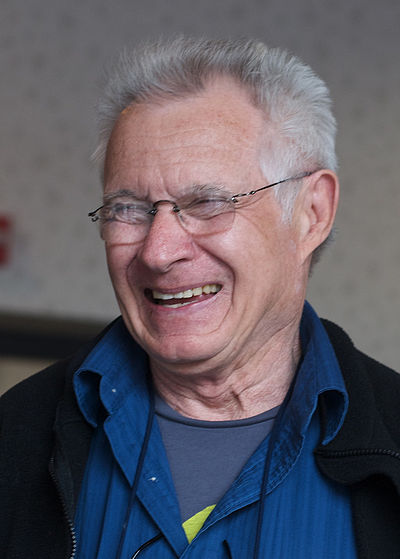
Search
Dave Grusin

Robert David Grusin (born June 26, 1934) is an American composer, arranger, producer, jazz pianist, and band leader. He has composed many scores for feature films and television and has won numerous awards for his soundtrack and record work, including an Academy Award and 10 Grammy Awards. Grusin is also a frequent collaborator with director Sydney Pollack, scoring many of his films like Three Days of the Condor (1975), Absence of Malice (1981), Tootsie (1982), The Firm (1993), and Random Hearts (1999). In 1978, Grusin founded GRP Records with Larry Rosen, and was an early pioneer of digital recording.
Early life
Grusin was born in Littleton, Colorado, to Henri and Rosabelle (née de Poyster) Grusin. His family originates from the Gruzinsky princely line of the Bagrationi dynasty, the royal family that ruled the Kingdom of Georgia in the ninth to 19th centuries. In Slavic languages, "Grusin" is an ethnonym for Georgians. Grusin’s father, Henri, was a violinist of Jewish ancestry who was born and raised in Riga, Latvia, then part of the Russian Empire, from where he emigrated to the United States in 1913. Grusin's mother, Rosabelle, was a pianist. He is the older brother of fellow jazz keyboardist, composer, and producer Don Grusin.
Grusin studied music at the University of Colorado at Boulder and graduated in 1956. His teachers included Cecil Effinger; and Wayne Scott, a pianist, arranger, and professor of jazz.
Career
Grusin produced his first single in 1962, "Subways Are for Sleeping", and his first film score, for Divorce American Style, in 1967. Other scores followed, including The Graduate (1967), Winning (1969), The Friends of Eddie Coyle (1973), The Midnight Man (1974), and Three Days of the Condor (1975).
In 1978, Grusin founded GRP Records with his business partner Larry Rosen, and began producing some of the first commercial digital recordings. Grusin was the composer for On Golden Pond (1981), Tootsie (1982), and The Goonies (1985). In 1988, he won the Oscar for Best Original Score for The Milagro Beanfield War. Grusin composed the musical signatures for the 1984 TriStar Pictures logo (which was credited at the end of Look Who's Talking Too) and the 1993 Columbia Pictures Television logo.
In 1998, Grusin ranked #5 and #8 on Billboard's Top 10 Jazz Artists, at mid-year and at year's end, respectively, based on sales of his album "Dave Grusin Presents West Side Story."
From 2000–11, Grusin concentrated on classical and jazz compositions, touring and recording with collaborators including jazz singer and lyricist Lorraine Feather and guitarist Lee Ritenour. Their album Harlequin won a Grammy Award in 1985. Their classical crossover albums, Two Worlds and Amparo, were nominated for Grammys.
Grusin has a filmography of about 100 titles. His many awards include an Oscar for best original score for The Milagro Beanfield War, as well as Oscar nominations for The Champ, The Fabulous Baker Boys, The Firm, Havana, Heaven Can Wait, and On Golden Pond. Grusin received a Best Original Song nomination for "It Might Be You" from the film Tootsie. Six of the 14 cuts on the soundtrack from The Graduate are his. Other film scores Grusin has composed include Where Were You When the Lights Went Out?, Three Days of the Condor, The Goonies, Tequila Sunrise, Hope Floats, Random Hearts, The Heart Is a Lonely Hunter, Mulholland Falls, and The Firm. He composed the original opening fanfare for film studio TriStar Pictures.
Grusin composed theme music for the TV programs Good Morning World (American TV series) (1967), It Takes a Thief (1968), The Name of the Game (1968), Dan August (1970), The Sandy Duncan Show (1971–72), Maude (1972), Good Times (1974), Baretta (1975), St. Elsewhere (1982), and, for Televisa in Mexico, Tres Generaciones (1987). He composed music for individual episodes of each of those shows. Grusin's other TV credits include The Wild Wild West (1966), The Girl from U.N.C.L.E. (1966), and Columbo: Prescription: Murder (1968). He composed and performed the 1984-1991 theme music for One Life to Live (1968). Grusin wrote the music for the This Is America, Charlie Brown episode "The Smithsonian and the Presidency", and two of the cues from the episode "History Lesson" and "Breadline Blues" (the latter covered by Kenny G) appear on the tribute album Happy Anniversary, Charlie Brown. "History Lesson" also appears in the Amiga CDTV version of Snoopy: The Cool Computer Game.
In 1994, GRP was in charge of MCA's jazz operations. Founders Grusin and Rosen left in the following year and were replaced by Tommy LiPuma. In 1997, Grusin and Rosen founded N2K Encoded Music, which was renamed N-Coded Music.
Grusin received honorary doctorates from Berklee College of Music in 1988 and University of Colorado, College of Music in 1989. He was initiated into the Beta Chi Chapter of Phi Mu Alpha Sinfonia at the University of Colorado in 1991.
Personal life
Grusin has been married to Nan Newton for many years and they have three adult sons: Scott, Michael, and Stuart. He is also the stepfather of Nan's adult daughter, Annie Vought. Grusin is the subject of a 2018 feature-length documentary, “Dave Grusin: Not Enough Time.”
Awards and honors
Over a 15-year period from 1979–1994, Grusin won an Academy Award, and received seven more nominations. He has been nominated for 38 Grammy Awards and won 10.
Academy Awards
- Winner, Music (Original Score): The Milagro Beanfield War (1989)
- Nomination, Music (Original Score): Heaven Can Wait (1979), The Champ (1980), On Golden Pond (1982), The Fabulous Baker Boys (1990), Havana (1991), The Firm (1994)
- Nomination, Music (Original Song): "It Might Be You" (1983), with Alan and Marilyn Bergman
Grammy Awards
- Winner, Best Original Score Written For A Motion Picture Or A Television Special: The Graduate (1968), shared with Paul Simon.
- Winner, Best Arrangement on an Instrumental: Summer Sketches '82 (1982), "Early A.M. Attitude" (1986), "Suite" for The Milagro Beanfield War (1990), "Bess You Is My Woman/I Loves You Porgy" (1991), "Mood Indigo" (1993), "Three Cowboy Songs" (1994)
- Winner, Best Instrumental Arrangement Accompanying Vocals: "My Funny Valentine" by Michelle Pfeiffer (1989), "Mean Old Man" by James Taylor (2002)
- Winner, Best Album Original Score Written for Motion Picture or Television: The Fabulous Baker Boys (1989)
- Nomination, Best Original Score: Selena
Golden Globe Awards
- Nomination, Best Original Score: The Milagro Beanfield War (1988), The Fabulous Baker Boys (1989), Havana (1990), For the Boys (1991)
Other
- Charles E. Lutton Man of Music Award, Phi Mu Alpha Sinfonia, 1991
- AFI's 100 Years of Film Scores (Best American Film Scores of all Time voted by the American Film Institute): #24 for On Golden Pond
Discography
As leader
As sideman
Filmography
See also
- List of music arrangers
- List of jazz arrangers
Notes
References
External links
- Dave Grusin at IMDb
- Music video sampler: Mountain Dance on YouTube
- Dave Grusin on Sound of Cinema, interviewed by Matthew Sweet. BBC Radio, 21 November 2020
- Performances of Dave Grusin's piano music
Text submitted to CC-BY-SA license. Source: Dave Grusin by Wikipedia (Historical)
Owlapps.net - since 2012 - Les chouettes applications du hibou



